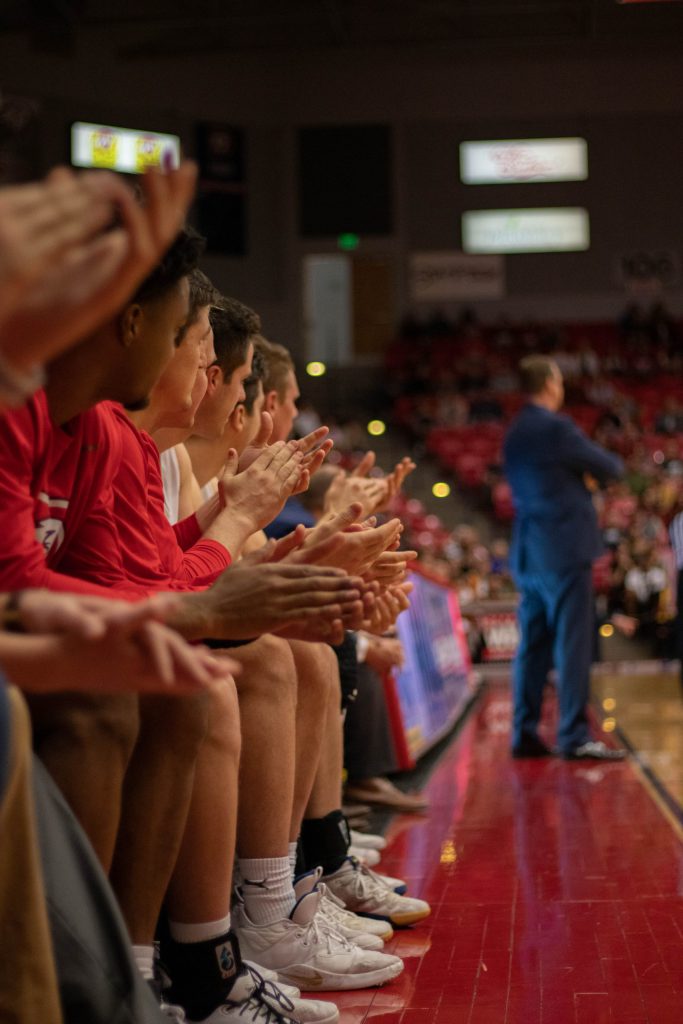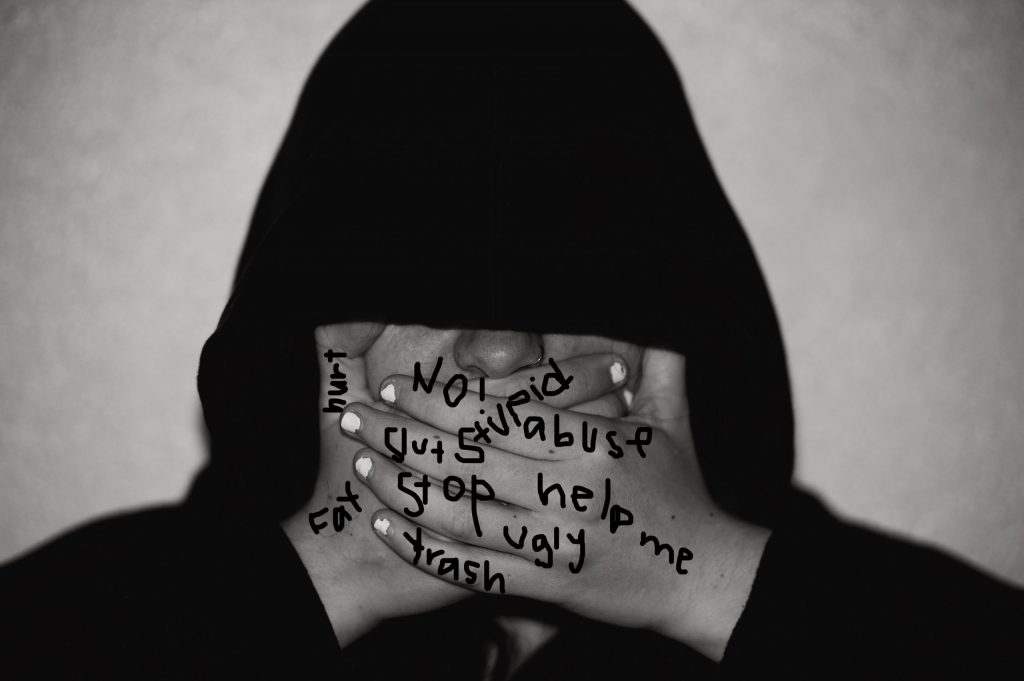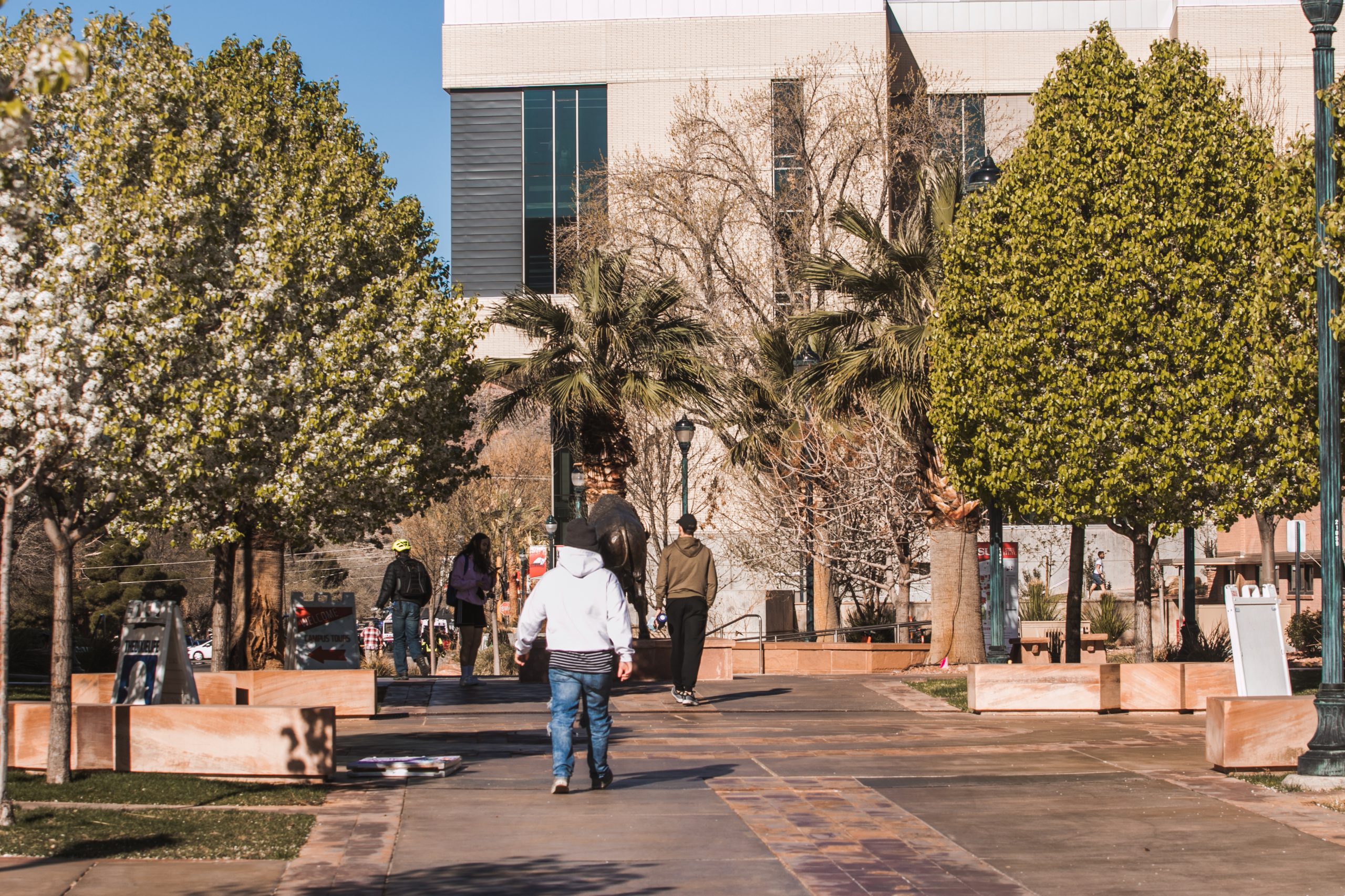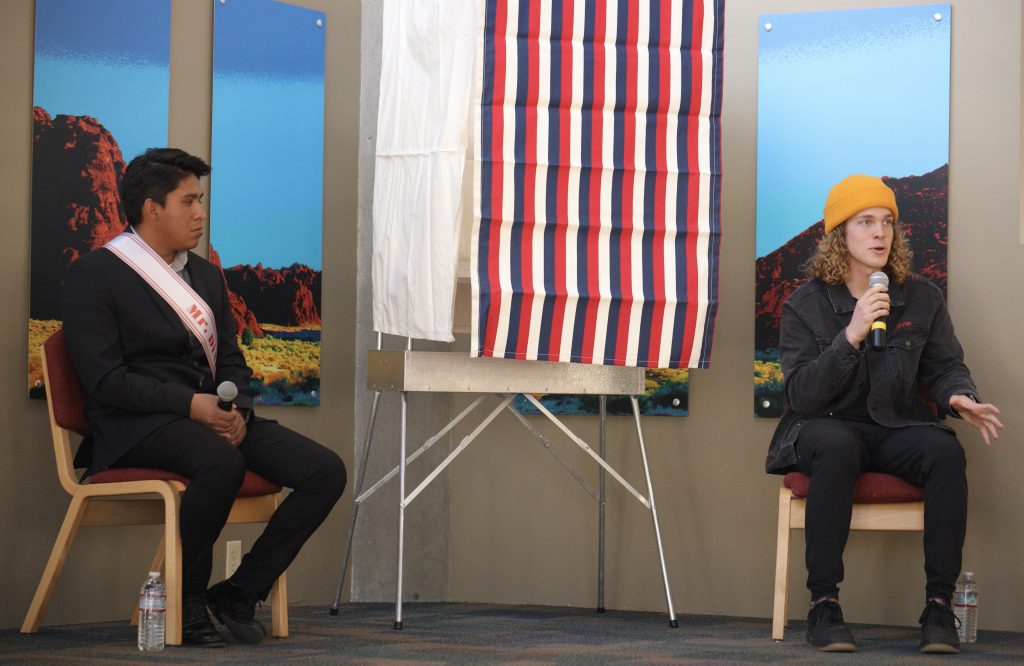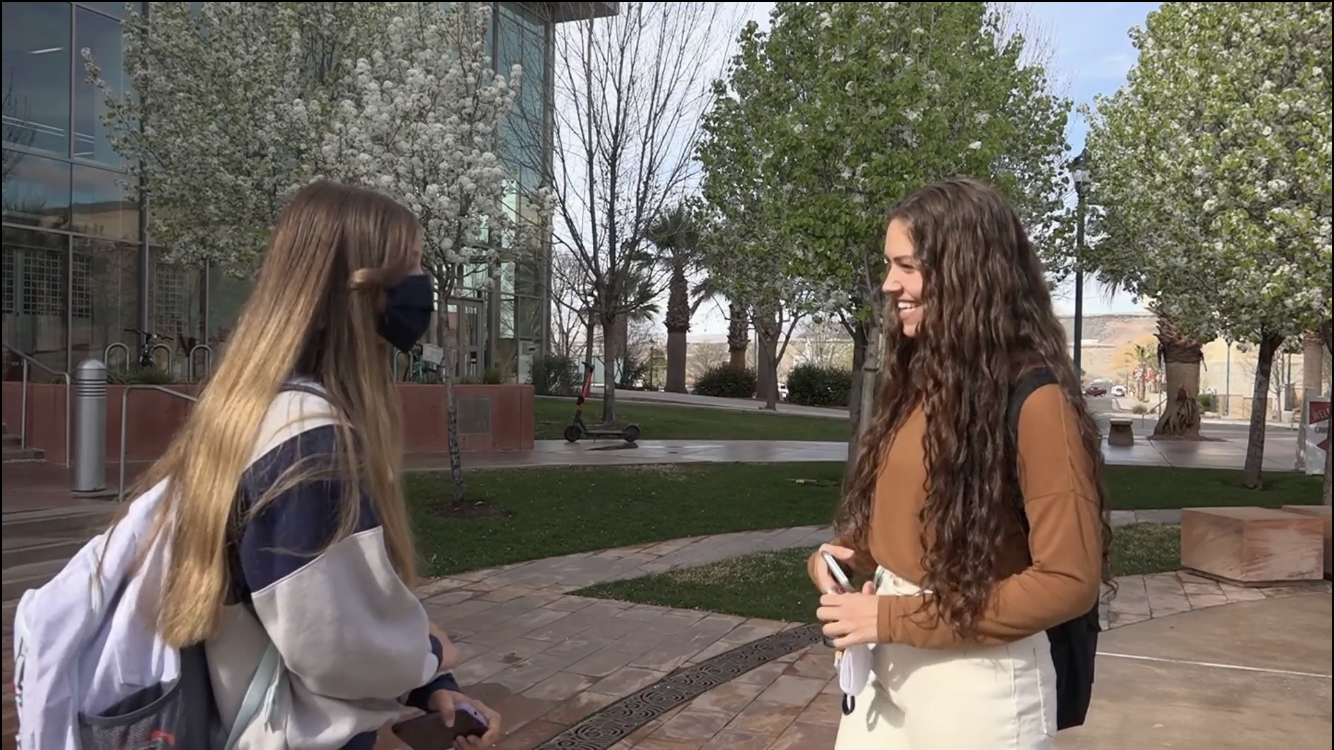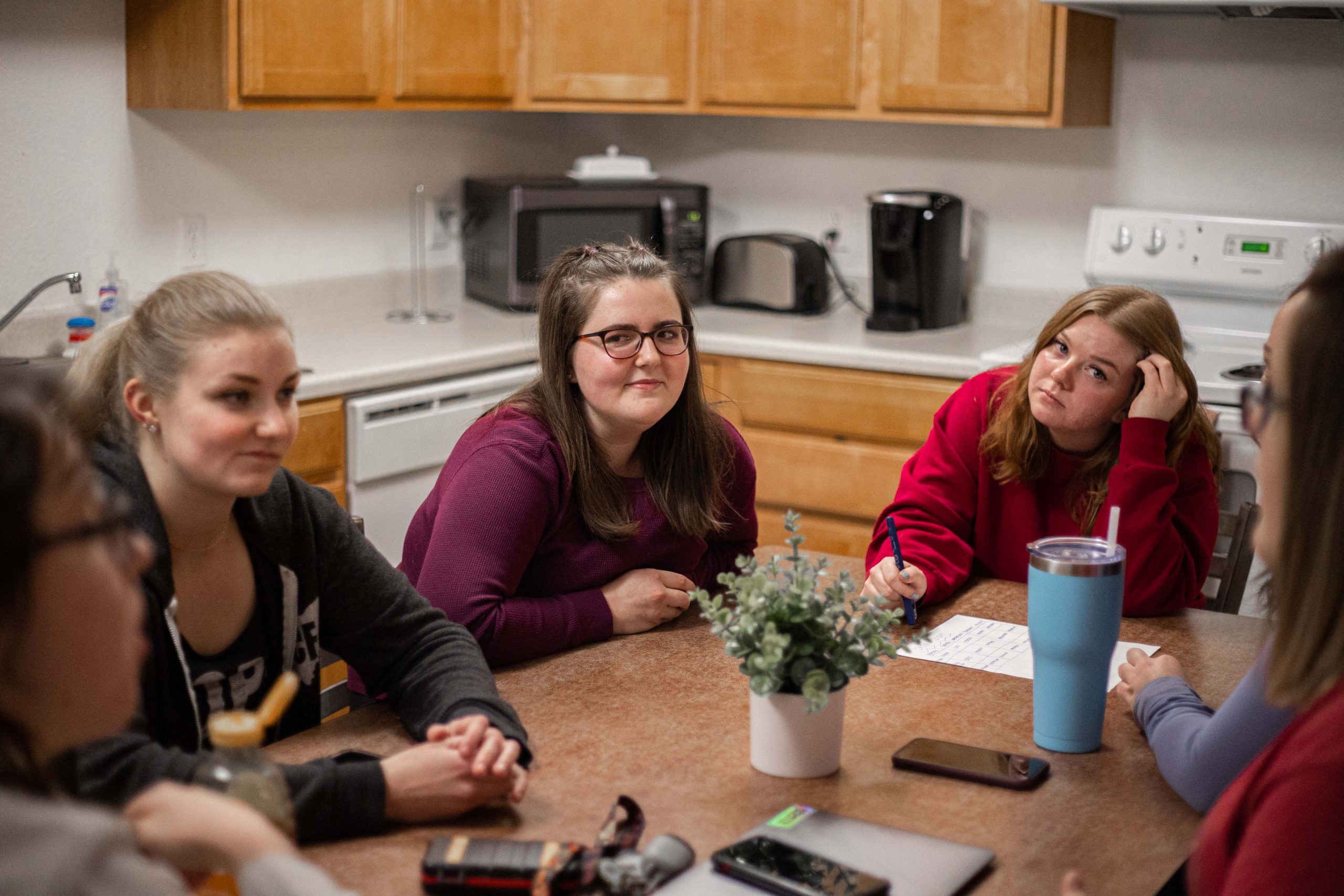Starting college can be hard especially if you’ve never had to share a living space with someone else before. On-campus residents comment on their past roommate experiences and ways to overcome potential roommate issues.
Month: March 2021
DSU football shuts out Fort Lewis College, proves it has moved on from Division II level
After dropping its first home game of the year March 13, the Dixie State University football team wanted to redeem itself for its last home game of the spring season March 27.
“We had to make up for our last home game honestly,” quarterback Kody Wilstead, a redshirt junior accounting major from St. George, said. “We came out pretty [pumped up for this game.] We didn’t want to do what we did last time [because] it was ugly and embarrassing quite frankly, so we came out ready to go and [full of energy.]”
The Trailblazers took on former Rocky Mountain Athletic Conference foe, Fort Lewis College. The Skyhawks started the game with the ball, but on the fourth play of the first series, they fumbled the ball and safety Darius Nash, a redshirt junior business administration major from Los Angeles, picked up the ball and took it down to FLC’s three-yard line.
Nash said setting the tone on defense has always been the mindset for the team and executing that through every play to help set up success for the offense.
Unfortunately, DSU’s offense couldn’t punch in the defensive turnover and it had to settle for a field goal taking an early 3-0 lead. The Trailblazers offense struggled on their next drive still trying to extend the lead; however, defense had the offense’s back and stopped the Skyhawks offense on three consecutive drives.
On DSU’s third offensive drive of the game, it struck gold when running back Quali Conley, a freshman computer science major from Fresno, California, took it to the house for the Trailblazers’ first touchdown of the game. From the moment of Conley’s touchdown, DSU’s offense lit up the scoreboard.
Wilstead had himself a night with 282 passing yards and tying a career high with five touchdowns. Overall, the offense had 124 rushing yards, 312 passing yards, and 436 yards total.
Wilstead said the offense had a fantastic game plan heading into the game, and offensive coordinator Kelly Bills called the right plays to perfectly execute the offense’s success.
The defense was on top of it by shutting down the FLC’s offense. The Trailblazers only allowed 82 rushing yards, 38 passing yards, five sacks, and one interception.
“It was fun to see that we can put a full game together, Nash said. “Seeing everybody making plays and when we can fire out on all cylinders, it shouldn’t matter who’s in front of us.”
The Trailblazers shut out the Skyhawks by a final 60-0. DSU finished its spring campaign with a 2-3 overall record.
Head coach Paul Peterson said his team is on the rise and continues to grow, and after the game against FLC it proves that the football program does belong in the Football Championship Subdivision.
“I just want us to keep progressing the best we can and keep improving, and I think today we took a step towards that,” Peterson said.
The main focus for the team heading into the offseason is to prepare for the fall season for this year and to strive to compete with the best teams at the FCS level.
“Our [team] when we talked to them after the game, they felt the [loss to] Kennesaw State and New Mexico State, [so] we got to be able to match their size and speed, attack this little part of the semester, this summer and be ready to go in August which will be coming up quick,” Peterson said.
Do’s, don’ts of negotiating your grades
Now that it’s nearing the end of the school year, you might be panicking about your grades. It’s crunch time, and for a lot of us, now is the time when we start desperately asking our professors what we can do for a better grade.
Katie Armstrong, director of college advisement and general education adviser, said: “Students should feel like they can talk to their professor about grades. I don’t think negotiating is the right word, but they should have an open and honest conversation.”
Here are the do’s and don’ts of communicating with your professors about your grades:
What to DO when asking a professor to change your grade
Mike Peterson, department chair and assistant professor of English, said one of the best ways to get a professor to open up about changing your grade is to go into it being kind and open.
“It’s the age old rule that you catch more flies with honey than vinegar,” Peterson said. “Treat your professor like a human being; don’t come in ready to fight or accusatory.”
Peterson also said don’t go in threatening to report them to the dean or department chair because it puts the professor in a defensive position.
Stacey Koller, general education adviser and English professor, said in addition to being nice to your professor, you should go into this process by asking if the professor can talk to you beforehand.
“Ideally, the student will come to your office hours or schedule an appointment,” Koller said. “If I know it’s coming, it’s much more welcome.”
As students, you need to remember that professors are also really busy, so allowing the professor to have time for the student is important, Koller said.
Finally, one of the most important parts is coming prepared to explain why you deserve a higher grade, Peterson said.
“It’s kind of like a legal case,” Peterson said. “You have the burden of providing the proof; it’s not the professor’s job to prove that they were right, it’s the students job to provide the evidence.”
Examples of evidence to have is assignments you can show, rubrics, instructions and other work to compare yours to in order to prove you’ve been working hard, Peterson said.
What NOT to do
Armstrong said students have to think about why they got the grade, and they need to take responsibility for those reasons before they can convince the professor to consider their situation. She said the student needs to go into the conversation with a desire to understand why they got the grade, not to blame the professor for their grade.
“You don’t want to accuse the professor of cheating [you] out of a proper grade, even if you think that’s what happened,” Armstrong said. “Being accusatory can cause a lot of issues and completely stop the conversation.”
Peterson said the student shouldn’t rely on emotions, but rather rely on the evidence. A professor can’t change your grade if your only reason is that you need a higher grade, he said.
“I’ve had students who have come to my office and asked for a higher grade with nothing more than a sob story,” Peterson said. “While all that tugs at my heart strings, there’s nothing I can do about it; they’ve got to provide more solid arguments, or else there’s nothing I can do about it.”
Peterson said along with avoiding emotional evidence that the students need to avoid coming up with stories to try and get a better grade, especially when talking to a department chair about a professor not making a student’s grade better.
“My advice, if you’re going to go to a department chair, be completely transparent and honest,” Peterson said. “Don’t paint a very one-sided picture because it only takes us a couple minutes to get the complete story.”
Resources to use for help
Koller said DSU has resources that students can utilize right now to try to prevent their grades from getting worse, and to prove to their professors that they are working to get a better grade.
“I would start with an adviser, but our Academic Performance Center of course,” Koller said. “Whatever the subject is, especially as a sophomore and freshman, there is probably a place where they can get free tutoring.”
Koller said if a student has a feeling that the cause of their difficulty in a course is because of an underlying reason, they can also reach out to the Disability Resource Center for extra help.
Armstrong said she recommends reaching out to OMBUDS if a student is having a hard time working with a professor or needs a mediator for that situation. It is a confidential program that can assist students and faculty in working out conflicts, and it can offer assistance when asking a professor about grade changes, Armstrong said.
Koller said usually when a student at this point in the year is struggling across the board and at risk of losing their scholarship, there isn’t much they can do about that situation. She said sometimes you just live and learn, but always try to reach out for help.
Koller said if worst comes to worst, the student can always appeal a lost scholarship if there is an underlying situation going on such as a mental or physical health problem.
“So many people are happy to help if they know you need it,” Koller said. “Don’t be afraid to ask for help.”
Sexual assault allegations bring attention toward resources available to students
Following the release of two safety notices regarding sexual assault and harassment, the Dixie State University Police Department continues to inform students of their resources on campus.
According to a safety alert from the university, the DSUPD has received multiple reports of alleged sexual assaults that have occurred on separate dates at a private residence on W. Bloomington Drive S.
Chief of Police Blair Barfuss said the Title IX office has received many off-campus sexual assault reports from DSU students that have occurred at the residence, but could not specify the exact number of cases.
Shortly after the allegations were brought to light, the university released a separate timely warning concerning a male suspect who was arrested and booked into jail on charges of stalking, unlawful detention, electronic harassment, failure to stop for police, and providing false information to a police officer.
Barfuss said the situation at hand was concerning. The student lived on campus, and the crimes occurred in the North Plaza parking lot.
These cases are currently under investigation, and both the DSUPD and St. George Police Department have declined requests to comment any further regarding these situations.
For situations such as these, DSU provides survivors with a variety of different resources including the Booth Wellness Center, Women’s Resource Center, Title IX Office and the Dove Center.
DSU’s Office of Equity Compliance and Title IX promotes “equity and inclusion in DSU’s educational programs and workplace through education, prevention and response to reports and complaints.”
If a DSU student is sexually assaulted, the first step should be to reach out to Hazel Sainsbury, director of equity compliance and title IX coordinator.
Sainsbury said, “We understand that when these traumatic events occur in a student’s life they need to know that DSU has the extra support to restore their safety and wellness.”
All cases that are brought to the Title IX office get taken seriously. The office’s role is to guide students to receive resources and to provide support for them to continue to participate in the academic institution.
If a DSU student is assaulted off campus, they can still report their case to Sainsbury.
“If one of our own experiences this, it does not matter where it occurred,” Sainsbury said. “Providing supportive measures is the best, quickest restorative thing we could do to ensure that a student can continue to participate.”
In some cases of sexual assault, the Title IX Office might refer a student to The Dove Center of St. George.
The center provides safe shelter and trauma-informed services to facilitate safety, healing and assault recovery; it also relentlessly pursues community education to increase bystander awareness and shift cultural norms.
Elizabeth Bluhm, rape and sexual assault recovery program manager and victim advocate for the Dove Center, said it is important for survivors of sexual and domestic abuse to reach out for help.
“It can be beneficial to hear from other survivors,” Bluhm said.
As a victim advocate, Bluhm leads survivors in a healing direction. She said it can be terrifying for the victim to talk about the assault and recover from the physical or emotional abuse.
The Dove Center offers various individual and group healing sessions for survivors to have a safe space to talk about their traumatic situation, and its resources are available from 3 p.m. to 5 p.m. every Monday at the DSU Women’s Resource Center.
If you or someone you know is experiencing stalking, dating violence, or are the victim of a crime, call police dispatch at 435-627-4300 or report it online at: https://dixie.edu/report-a-concern/.
OPINION | LDS church deserves to be taxed
There is no doubt that religion is meant to be separate from state law. This is acknowledged through our First Amendment, which states that “Congress make no law respecting an establishment of religion or prohibiting its free exercise.” In Utah, it is difficult to respect the prior simply because over 62% of people in the state belong to the Church of Jesus Christ of Latter-day Saints. Therefore, an easy solution to religion in politics, at least in Utah, is to tax the LDS church.
Something that sets the LDS church apart from other religious organizations in this state is that it owns Deseret Management Corporation, which is a parent company that owns businesses like Deseret News. A church that has a reach across businesses ought to be questioned. Currently, the majority of Latter-day Saints lean Republican because of the church’s values.
The church also advocates strongly for tithing amongst its members, something that looks like a membership fee. Whether seen as a corporation or political pact, there is no doubt that the church is the driving force in how Utah politics are justified and run.
The official stance of the LDS church is to be politically neutral, and it encourages its members to vote, regardless of who they choose to vote for. But it is contradictory of the church to be politically neutral if its values dictate what its members believe.
The church is against same-sex marriage, but if one of its own members votes for someone who supports it, wouldn’t they be sinning in the eyes of the church? Don’t we see how the church directly influences its members?
The LDS church also has an extreme wealth, totaling $100 billion in 2019, that is stockpiled in accounts rather than going to charitable causes. Thus, with the LDS church having a political voice, voting body, businesses and a vast wealth, it should be classified as a corporation.
The LDS church and its beliefs have directly influenced state politics, which goes against the Constitution. It is obvious this religious corporation has representation and now needs taxation.
Students hopeful for lifting of campus mask mandate
With the Utah’s mask mandate being lifted April 10, students express their hope for the campus mask mandate to be lifted in the near future while still continuing to be as cautious as we can.
‘Start by believing:’ How DSU, community are fighting stigma surrounding sexual assault advocacy
“What were you wearing that provoked them?”
“How much did you have to drink? You obviously were not in the right frame of mind.”
“Well, why did you lead them on if you weren’t ready to have sex?”
“It’s your fault; you brought this upon yourself.”
According to Utah’s Public Health Data Resource, one in six women and one in 25 men from Utah have experienced rape or attempted rape during their lifetime.
“One in three women will experience some form of sexual violence during their lives,” the website states.
Elizabeth Bluhm, a DOVE Center rape and sexual assault victim advocate, said the negative stereotypes and stigma surrounding believing survivors of sexual assault are very much alive.
“Sometimes when a sexual assault victim, well I prefer to call them survivors, tell others what happened — loved ones, friends, roommates or whoever, the first response is victim-blaming,” Bluhm said.
When victim-blaming happens, a sexual assault survivor will typically start to believe that whatever inappropriate sexual act was performed on them was actually their fault, Bluhm said.
“Women are taught risk reduction strategies, but those won’t always work when the crime is truly in the hands of the perpetrator,” Bluhm said. “We, as women, want to believe we have more control over the situation than we actually do.”
Blair Barfuss, Dixie State University chief of police, said most sexual assault victims on campus do not report the incident to the public safety department, but when they do, it is taken seriously.
Barfuss said: “When I came to DSU just under three years ago, I realized there were a number of things missing, specifically the community engagement, the active campaign piece, policies and procedures were missing, as well as standard protocols, all surrounding sexual assault.”
One of the things Barfuss implemented after noticing the lack of protocols surrounding sexual assault on campus was training for all officers to learn how to correctly interview and support sexual assault victims.
“One of the campaigns I was familiar with and truly believed in was the Start by Believing campaign,” Barfuss said. “I signed our police department up for it and completed all of the necessary paperwork in order to better our efforts of fighting that stigma of sexual assault victim-blaming.”
The Start by Believing campaign is a “non-profit organization dedicated to improving criminal justice responses to sexual assault,” according to its website.
The website consists of survivor options and plans, ways for people to join the organization and donate to better help support victims of sexual assault, and identifies other helpful resources.
The DSUPD has engaged with students via social media platforms to spread more awareness about the Start by Believing campaign. Barfuss said he encourages students to use social media to participate in the campaign as a way to advocate for sexual assault victims.
If a survivor of sexual assault confides in you, the best advice you can give them right away is to get a medical check up to avoid getting an STI and point them in the direction of the right people to speak to, Bluhm said.
Bluhm visits with sexual assault survivors and walk-ins at the DSU Women’s Resource Center on Mondays from 3 p.m. to 5 p.m.
“The benefit of speaking with a community-based advocate is that we are not required to then report anything the survivor doesn’t want us to,” Bluhm said.
Florence Bacabac, director of the DSU Women’s Resource Center, said the free advocacy service is strictly confidential.
“This is our DOVE Advocacy Service through WRC, and it’s for all students, faculty and staff across genders who are survivors of, or have questions about, sexual and domestic assault,” Bacabac said.
Bluhm recommends for students to uplift and encourage any sexual assault victim who confides in them.
“Your attitude going into any interaction with a [sexual assault] survivor should be empowerment, empowerment, empowerment,” Bluhm said.
Bacabac said the Women’s Resource Center is hosting an upcoming virtual event about fighting the stigma surrounding victim-blaming and sexual assault on April 7 with the DOVE Center for the Sexual Assault Awareness Month.
“Our guest speaker is Courtney Cannon, the educator coordinator of the DOVE Center, and she will be talking about ‘Response and Responsibility,'” Bacabac said.
OPINION | Ending mask mandate will only make things worse
Ending the mask mandate for Utah on April 10 is only going to make things worse for people.
Predictions made earlier this year told us that the mandate should end before the summer of 2022, maybe even earlier, but it shouldn’t be this early.
As a new variant of COVID-19, also known as B 1.1.7, makes its way into the United States, now is not the time to take a form of protection away. The CDC said this new strand of COVID-19 would be the dominant strand in the U.S. by March.
The B 1.1.7 strand was found to be more transmittable and exhibits rapid growth. Knowing this, why would any states still want to lift their mask mandates? It’s unsafe and could be extremely dangerous for high-risk people.
In an article by Deseret News, Dr. Anthony Fauci, the White House coronavirus adviser, confirmed that it is risky to end the mask mandate because the coronavirus is still circulating throughout the United States. The virus still exists even with the new vaccines rolling out, and now is the time we want as much protection as possible against it.
There are people who don’t believe masks do anything to protect us from the virus, but that’s been proven to be false. In a study done by the Mayo Clinic, it was found that even a simple cloth mask can prevent people from spreading and getting infected with the virus. In other words, not only can masks prevent people from getting the virus, but it also stops those that already have the virus from spreading it to others.
As the pandemic continues, more and more people are rebelling against wearing their masks in public. Even just going into Walmart, it’s crazy how many people I’ll see wearing their masks under their chin or not even wearing one at all. This is part of the reason we are still in a pandemic; people are not following safety and health guidelines, and they are putting others at risk.
I know there are people with mask anxiety, and mask are hard to breathe in and uncomfortable to wear sometimes, but not wearing them will make you and others around you vulnerable to infection. If you don’t want to wear a mask in public, avoid putting yourself in that setting as much as possible. Think about all the people you could potentially be putting in harm’s way by not following the public health guidelines.
As annoying as masks are and as much as everyone doesn’t like wearing them, we can’t deny that they are helping slow the spread of COVID-19. Ending the mask mandate can send us reeling back to when this all started when there were thousands of cases every day.
Even though Gov. Spencer Cox signed the bill to lift the mandate in Utah, we should still continue to wear masks in public to protect ourselves and others. If we want to avoid going back into a statewide quarantine, masks are the least we can do to help.

DSU will maintain mask mandate through remainder of semester
Utah Gov. Spencer Cox signed a bill March 22 to lift the statewide mask mandate starting April 10, but certain restrictions will still be required on Dixie State University’s campus until the semester ends.
President Richard “Biff” Williams said protecting students and faculty while keeping campus stakeholders in the loop is the top priority, and subcommittees of the university’s COVID-19 Task Force and members of his cabinet are still strategizing how to fully adjust to the COVID-19 updates.
“Class conduct and instruction will stay the same through the end of the semester,” Williams said.
While masks will not be required outdoors or when social distancing is possible, they may still be compulsory during planned outdoor student events.
Josh Thayn, executive director of events services and risk management, said there has been a high success rate of preventing the spread of COVID-19 via the use of masks, and since the semester will be over shortly after the mandate lifts, the simplest option is to keep wearing them at least until summer.
Both Williams and Thayn confirmed that maintaining the current mask rules for indoor settings is in line with all Utah System of Higher Education peers and K-12 public schools in the state.
Thayn said, “Continuing the current mask policy and other mitigating measures will allow for more individuals to receive their vaccines and will help keep our campus community safe and moving in the right direction to help us return to normal more quickly.”
As more students and faculty get immunized for COVID-19, the university hopes to open at full capacity without any social distancing or mask restrictions in fall 2021.
Like in the fall 2020 semester, if students should refuse to continue wearing masks on campus after April 10, they can request to opt into all live-streamed classes for remote learning.
Unless a student meets the criteria required to be exempt from wearing a mask, any student who fails to comply with the continued mask protocol may be asked to leave class by their professor, denied access to buildings on campus or escorted off the university property by campus security, according to DSU’s website.
Michael Lacourse, vice president of academic affairs and university provost, said the DSU administration believes all students will be cooperative in following the health guidelines until further notice.
“We are grateful that students have adhered to the mask and social distancing requirements during the fall semester and most of the spring semester,” Lacourse said. “We ask that students be respectful of the faculty and their fellow students and continue with wearing their masks.”
Reasoning with roommates: how to get along with your college roommates
Moving to a new place, making a new home, and living with all new people can sound scary and stressful. There are ways to deal with the stress of getting along with new roommates in order to have a smooth school year.
If you are in an apartment with roommates, whether you are best friends with them, they are complete strangers, or you barely know them, here are tips that everyone needs about living with roommates:

Set expectations sooner rather than later
Before getting too comfortable, set your own living expectations with your roommates for the time you will be living together. Ensure that everyone is on the same page when it comes to how the dynamic within your household will be.
Kyra Chambers, a junior communication studies major from Tooele and a resident assistant at Campus View Suites, said: “Once you are all moved in, sit down and have a meeting with all your roommates. In this meeting, talk about expectations, boundaries, preferences and respect you would like to have while living together.”
Setting expectations such as who does the dishes each day, who has the responsibility of cleaning the bathroom, or who should take out the trash are all things that need to be talked about with roommates, Chambers said.

Maintain constant communication
It may sound cliche, but communication is key when dealing with rising problems or issues.
You cannot expect your roommates to know how you are feeling about something if you are not communicating your feelings with them. Your roommates need to be telling you how they are feeling as well. Communicate with your roommates any ideas, problems or boundaries that you want to put in place.
Benjamin Filkins, resident life area coordinator, said to make sure that when communicating with your roommates you are interested in making a situation work for everyone. For example you could say, “I’d like to work together to find a solution that works for all of us.”
Not all of your communication will be about issues or problems you have come across. A simple conversation will be beneficial when getting to know your roommates, and spending time doing things with each other will also allow more trust to be built, Filkins said.

Remember, you are not the only one living in the space
“Be self-aware; take time to think about how your actions affect the people around you,” Filkins said.
You are not the only one living in the space. Be sure to take the time to clean up after yourself because your mess may frustrate your roommates. If every roommate is cleaning up after themselves, there will be no problems in that aspect of living together.
Leslie Smart, a freshman English major from Melissa, Texas, said: “In order to make living together peaceful and respectful, it takes making sure that there is some give and take, [as well as] being flexible and adaptable. … It takes work, but it is worth it because no one wants to live with people they can’t get along with.”

Don’t take things too personally
There may be times when your roommates do something that you do not like or agree with that may offend you — scratch that: There will probably be many times.
Do not take this personally; they may not be aware of how it is affecting you. Communicate with them and express your feelings about the matter, and they will most likely be more than willing to make a change.
“Don’t wait for the roommate who is bothering you to bring up the issue; they might never bring it up,” Chambers said. “It‘s always best to make the first move.”
Take it upon yourself to start those conversations about things that are bothering you. You are the only one who knows how you feel about something that is pushing your buttons.

Your resident assistant or landlord will be your best friend
The resident assistant or landlord is going to be your best resource when moving into a place with new people. They are there to help you out with any questions, problems and other situations.
They have dealt with roommate situations in the past and they will be helpful to you. They may even be able to relocate you or a roommate if the case is extreme enough to do so.
“Don’t be afraid to ask your resident assistant for help,” Filkins said. “They have training to effectively conduct roommate mediations to work through these types of situations and can act as an unbiased third party.”




